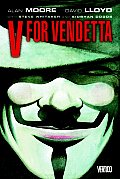Moore’s “concepts that I wanted to reflect in V”
As long as I’m cogitating about comics writer Alan Moore’s inspirations, I’ll quote something striking he wrote about V for Vendetta, his breakthrough series with David Lloyd. In an article published in England in 1983 as that comic was being published, reprinted as an afterword in the 1990 DC Comics collection, Moore wrote:
But for Moore, the “concepts that I wanted to reflect” were the work of previous storytellers and performers. Even in a work of protest about the direction of British politics, he was thinking about science fiction, comics, and old movies.
No wonder Douglas Wolk writes in Reading Comics that “Virtually every comic Moore has written is inspired by some kind of pop-culture source of the past that he can elaborate and improve on.” In fact, Wolk listed V for Vendetta among the few “totally original major creations in [Moore’s] bibliography” (along with “A Small Killing, the never-finished Ballad of Halo Jones, the never-finished Big Numbers”). But that might be because Moore cast a wider net for “concepts that I wanted to reflect.”
One night, in desperation, I made a long list of concepts that I wanted to reflect in V, moving from one to another with a rapid free-association that would make any good psychiatrist reach for the emergency cord. The list was something as follows:For many writers, “concepts” might be themes or emotions. For others, they might be imagined scenes, or memories. For others, they might be questions about real people and their decisions. And so on.
Orwell. Huxley. Thomas Disch. Judge Dredd. Harlan Ellison’s “‘Repent, Harlequin!‘ Said the Ticktockman.” “Catman” and “Prowler in the City at the Edge of the World” by the same author. Vincent Price’s Dr. Phibes and Theatre of Blood. David Bowie. The Shadow. Nightraven. Batman. Fahrenheit 451. The writings of the New Worlds school of science fiction. Max Ernst’s painting “Europe After the Rains.” Thomas Pynchon. The atmosphere of British Second World War films. The Prisoner. Robin Hood. Dick Turpin...
But for Moore, the “concepts that I wanted to reflect” were the work of previous storytellers and performers. Even in a work of protest about the direction of British politics, he was thinking about science fiction, comics, and old movies.
No wonder Douglas Wolk writes in Reading Comics that “Virtually every comic Moore has written is inspired by some kind of pop-culture source of the past that he can elaborate and improve on.” In fact, Wolk listed V for Vendetta among the few “totally original major creations in [Moore’s] bibliography” (along with “A Small Killing, the never-finished Ballad of Halo Jones, the never-finished Big Numbers”). But that might be because Moore cast a wider net for “concepts that I wanted to reflect.”



No comments:
Post a Comment